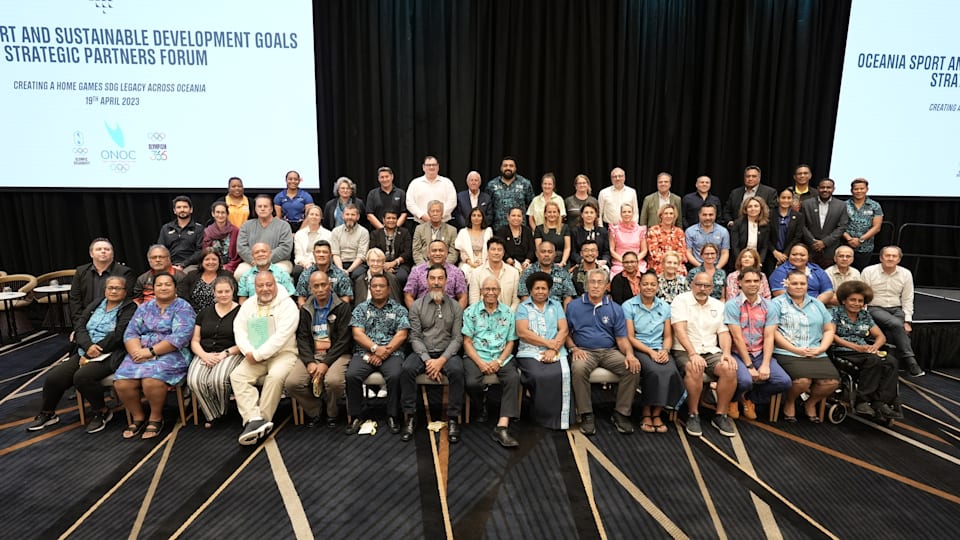Oceania Forum sparks commitment to strengthen sport’s role in sustainable development ahead of the Olympic Games Brisbane 2032
Regional leaders, development organisations and the Olympic and sports movement have committed to strengthening the use of sport as a tool for sustainable development in Oceania in the lead-up to, and beyond, the Olympic Games Brisbane 2032.

The commitment was made during the Sport and Sustainable Development Strategic Partners Forum, which was convened by the Oceania National Olympic Committees (ONOC) and the International Olympic Committee (IOC), in conjunction with the Pacific Regional Sports Taskforce (PRST), during last week’s ONOC General Assembly in Brisbane.
The Forum brought together a diverse group of stakeholders, including multilateral development financing institutions, bilateral partners and donors, UN entities, Council of Regional Organisations of the Pacific (CROP) agencies, and regional inter-governmental organisations, along with leaders of the Olympic and sports movement in the region.
The participants recognised sport’s potential to contribute to sustainable development in Oceania and agreed to increase investment, strengthen coordination and enhance policy frameworks to maximise its impact ahead of the Olympic Games Brisbane 2032. Their commitment aligns with the IOC’s Olympism365 strategy, which is aimed at strengthening the role of sport as an important enabler for the UN Sustainable Development Goals (SDGs).
“The Olympic and Paralympic Games Brisbane 2032 represent an exciting opportunity for Oceania,” said Auvita Rapilla, IOC Member and Chair of the IOC’s Olympism365 Commission. “It is well recognised that these ‘Home Games’ have the potential to spur improved performances of our athletes and teams. Nevertheless, they can also be a catalyst to enhance the positive impact that sport and the Olympic Movement can have in communities across our diverse region, contributing to the improved health and well-being of our people across the Blue Continent.
“Realising the potential of sport to make a positive impact has arguably never been more important. Considering the ever-intensifying environmental, health and economic challenges facing our countries, strengthening the use of sport as an enabler of the Sustainable Development Goals is imperative.”
Key outcomes for the region
One of the key outcomes of the Forum was the formation of consortia working to align efforts and resources to effectively leverage the power of sport to address the UN SDGs in the region, with an emphasis on safe, inclusive and sustainable approaches that support young people, athletes, and women and girls in becoming key agents of change.
This multi-system approach highlighted at the Forum has already proved to be a catalyst, with a number of UN and regional organisations setting out plans and commitments to work to strengthen sport’s role in sustainable development:
- Capacity building on promoting sport and physical activity to deliver public health outcomes will be explored with the World Health Organization (WHO);
- Collaboration with UN Habitat in promoting sport and fitness friendly cities as part of the SDG Cities initiative is being developed;
- Opportunities to strengthen sport and youth crime prevention are being discussed with the UN Office on Drugs and Crime (UNODC);
- Opportunities to strengthen climate adaption, resilience, advocacy and education will be explored together with UN Climate Change (UNFCCC);
- Work is being done on capacity building and policy frameworks in partnership with the UN Environment Programme (UNEP), the Secretariat of the Pacific Regional Environment Programme (SPREP) and the International Union for Conservation of Nature (IUCN) to enhance action on sport, climate action, environmental sustainability and conservation through sport, a vital subject for the region;
- The IOC will also be joining ONOC in an Oceania-led and seeded sport, equality and inclusion network that also includes UN Women and the Australian Government’s sport for development programme “Team Up”, to intensify work to advance gender equality and inclusion in and through sport in the region.
These efforts will also contribute to the 2050 Strategy for the Blue Pacific Continent, which sets out Oceania’s approach to collectively work together to achieve its long-term goals and secure the region’s future against current and future challenges. This includes supporting the delivery of the Pacific Sport, Physical Activity and Physical Education (SPAPE) Action Plan 2019-2030. These efforts will be coordinated by the PRST, with the support of ONOC and the IOC, including through the provision of technical and financial assistance to help facilitate joined-up approaches and impact.
According to Henry Puna, Secretary General of the Pacific Islands Forum, emphasising the considerable links between sport and sustainable development is vital to achieving the region’s long-term vision.
“I am really pleased to note [the Forum’s] integration of the Pacific 2050 strategic direction, set by our leaders, into this work,” he said. “It is a key part of how Pacific leaders are setting our development agenda right now, and we know the impact level, where we meet our people where they are, must involve all things sport.
“The Olympic Movement, represented for us through the Oceania National Olympic Committees, is a key Forum civil society partner in that regard. The impact of sport on healthy communities and nations has been universally accepted for many years now. But we are at a tipping point, if you will, especially with the clock ticking to 2030 on the Sustainable Development Goals.”
Addressing Forum attendees, he continued: “Your being here is recognition of the impacts and benefits gained at all levels of development, when there is effective regional coordination of sport, physical activity and physical education. From a regional perspective, strategic engagements in policy, advocacy and research have helped to position sport as a regional policy priority.
“These connections help to ensure we are working in harmony and leveraging a significant legacy across the Pacific and Oceania for sport as an enabler of sustainable development.”